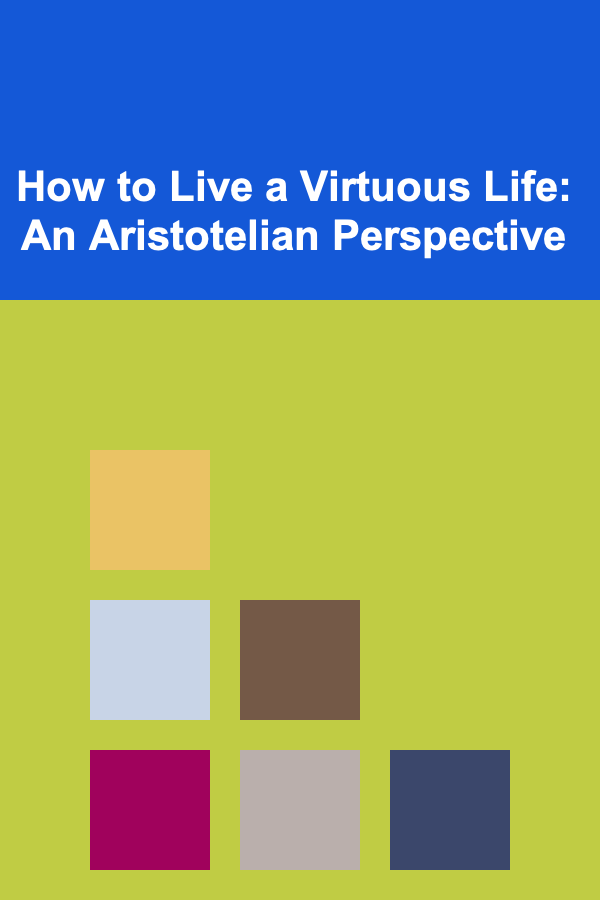
How to Live a Virtuous Life: An Aristotelian Perspective
ebook include PDF & Audio bundle (Micro Guide)
$12.99$9.99
Limited Time Offer! Order within the next:

Aristotle, one of the most influential philosophers in Western thought, is renowned for his comprehensive ethical theory that stresses the importance of living a virtuous life. His ethical framework, known as Aristotelian ethics, has shaped philosophical discourse for centuries and continues to resonate with contemporary debates about moral philosophy, personal development, and well-being. At the heart of Aristotle's ethics lies the concept of eudaimonia, often translated as "flourishing" or "well-being." To achieve this state of flourishing, Aristotle argued, one must live a life guided by virtue, cultivating good character and making choices that lead to the fulfillment of one's true nature.
In this article, we will explore how to live a virtuous life from an Aristotelian perspective, delving into key concepts like virtue, the golden mean, and the role of reason in ethical decision-making. We will also discuss practical applications of Aristotle's ethical ideas in the context of modern life, considering how they can be incorporated into personal growth, relationships, and societal engagement.
Aristotle's Concept of the Good Life
The Pursuit of Eudaimonia
At the core of Aristotelian ethics is the idea that every human being has a natural purpose or telos, which is the ultimate goal of life. This purpose is to live in a way that fosters eudaimonia, a Greek word often translated as "happiness," but more accurately understood as "flourishing" or "well-being." Eudaimonia is not a transient state of pleasure or fleeting moments of satisfaction; rather, it is a long-term, holistic fulfillment that arises from living in accordance with one's true nature.
Aristotle famously stated in his work Nicomachean Ethics, "The good for man is an activity of the soul in accordance with virtue, in a complete life." For Aristotle, eudaimonia is achieved not by the accumulation of wealth, power, or material pleasures, but by the cultivation of virtuous character and living a life of rational activity.
Rational Activity and Human Nature
For Aristotle, human beings are distinct from other animals because of their capacity for reason. The rational soul allows individuals to make choices and reflect upon those choices, enabling them to act in ways that promote their own well-being and the well-being of society. This capacity for reason is central to Aristotle's ethical theory, as it helps guide individuals in making morally good decisions.
To live a virtuous life, one must align their actions with rationality. This means that virtue is not simply about doing good deeds, but about making choices that reflect reason and lead to the development of good character. It involves a process of self-examination, learning, and practical wisdom (phronesis), all of which contribute to a fulfilling and meaningful life.
Virtue and the Golden Mean
What is Virtue?
In Aristotle's view, virtue is a state of character that lies between two extremes: deficiency and excess. Virtue is not a matter of simply following rules or doing good deeds in isolation; it involves the development of a virtuous disposition that enables individuals to make the right choices in different situations. Virtue, for Aristotle, is a habitual way of acting that reflects moral excellence and is expressed through the exercise of reason.
Aristotle defines virtue as a trait that enables an individual to perform their function as a human being in the best possible way. The central concept here is that virtue is related to the human ability to reason and make choices that lead to flourishing. A person who possesses virtue is able to act in accordance with reason, avoid moral failings, and ultimately lead a life that promotes eudaimonia.
The Golden Mean
Aristotle's most famous contribution to moral philosophy is his doctrine of the golden mean. According to this principle, virtue lies between two extremes: one of excess and one of deficiency. The golden mean represents the optimal balance between these extremes, and it is through cultivating this balance that an individual achieves virtue.
For example, courage is a virtue, but it lies between the extremes of recklessness (excess) and cowardice (deficiency). A courageous person faces danger or adversity with bravery, but they do not do so recklessly or without consideration of the risks involved. On the other hand, someone who is cowardly may shy away from opportunities or challenges, failing to live up to their potential.
In practice, the golden mean can be applied to many areas of life, such as temperance, generosity, and honesty. For instance:
- Generosity: The virtue lies between prodigality (excessive generosity) and stinginess (deficient generosity).
- Temperance: The virtue lies between indulgence (excessive pleasure-seeking) and insensitivity (lack of enjoyment).
- Truthfulness: The virtue lies between boastfulness (exaggerating the truth) and self-deprecation (underplaying the truth).
Finding the Golden Mean in Practice
The golden mean is not a one-size-fits-all formula. It requires practical wisdom (phronesis) to apply the concept of balance to real-life situations. This means that individuals must evaluate each situation individually, considering the context, the people involved, and the possible consequences of their actions. The goal is to find the balance that leads to flourishing, which may vary from person to person.
For instance, in the case of generosity, one person might be able to give large sums of money to charity, while another may find that a smaller, more consistent contribution is a better fit for their circumstances. Both are practicing virtue, as long as they are avoiding the extremes of excess or deficiency.
The Role of Reason and Practical Wisdom
The Importance of Practical Wisdom (Phronesis)
Practical wisdom, or phronesis, is the ability to make the right decisions in complex, real-life situations. It is one of the key components of Aristotle's ethical framework, as it allows individuals to apply general principles of virtue to specific situations. Practical wisdom is not something that can be easily taught through rules or formulas; rather, it is developed through experience, reflection, and learning from one's actions.
Practical wisdom involves both intellectual and moral components. Intellectually, it requires the ability to understand the consequences of different courses of action, as well as the nuances of moral dilemmas. Morally, it involves the ability to choose the right course of action, even when faced with difficult or conflicting options. Aristotle suggests that practical wisdom is essential for achieving eudaimonia, as it allows individuals to navigate the complexities of life in a way that promotes their well-being and the well-being of others.
Reason in Decision-Making
Aristotle's ethical theory emphasizes that reason should guide our actions. Virtuous people are those who have cultivated the ability to act in accordance with reason, consistently making choices that are rational, thoughtful, and aligned with the pursuit of eudaimonia. This requires more than simply following rules or moral prescriptions; it requires a deep understanding of the nature of good actions and their impact on our lives.
In Aristotle's view, reasoning is not just about calculating the best means to an end, but also about developing a moral sensibility that can discern the right thing to do in any given situation. Reasoning involves a blend of intellectual understanding and emotional sensitivity, which allows individuals to make decisions that contribute to their personal flourishing and the well-being of others.
Developing Virtue: A Practical Guide
The Role of Habit
According to Aristotle, virtue is developed through practice and habit. Just as athletes build skill and endurance through regular training, individuals can cultivate virtue through consistent, deliberate actions. Virtue is not innate; it is a learned and cultivated trait that arises from repeatedly making virtuous choices over time.
To live a virtuous life, one must actively practice virtuous actions, even when it is difficult or uncomfortable. Over time, these actions become habitual, and the individual's character begins to reflect the virtues they have developed. Aristotle emphasizes that habit is a powerful force in shaping our behavior, and by cultivating good habits, we can gradually transform ourselves into virtuous individuals.
The Role of Community
Aristotle also believes that community plays a vital role in the development of virtue. While virtue is an individual pursuit, it is also nurtured within the context of relationships and social engagement. Aristotle's ideal society is one in which individuals work together to promote the common good, helping each other to develop their moral character and achieve eudaimonia.
Being part of a virtuous community provides individuals with support, guidance, and accountability. Engaging in relationships with others who share similar values can inspire and motivate individuals to live more virtuous lives. Moreover, communities provide opportunities for individuals to practice virtue in real-world contexts, such as through acts of kindness, cooperation, and service to others.
Embracing the Full Potential of Human Life
To live a virtuous life, one must not only focus on avoiding vice or wrongdoing but also strive to embrace the full potential of human life. This means engaging in activities that foster personal growth, creative expression, and the development of one's unique talents and abilities. Aristotle's ethics emphasizes the importance of self-actualization and the pursuit of excellence in all aspects of life.
This may involve pursuing intellectual endeavors, cultivating meaningful relationships, or contributing to the greater good through acts of service or social engagement. The key is to live intentionally, guided by reason, and to pursue activities that align with one's true nature and contribute to personal and collective flourishing.
Conclusion: The Path to Eudaimonia
Living a virtuous life, according to Aristotelian ethics, is not a simple task, but it is the key to achieving eudaimonia --- a life of flourishing, fulfillment, and well-being. By developing virtues such as courage, generosity, temperance, and wisdom, individuals can create a life that is not only good for themselves but also beneficial to those around them.
Through the practice of virtue, guided by practical wisdom and reason, we can align our actions with our true nature and achieve the ultimate goal of human life: living in accordance with our highest potential. Whether in personal relationships, professional pursuits, or societal contributions, the path to a virtuous life is a continuous process of growth, reflection, and self-improvement.
In the end, Aristotle's philosophy teaches us that the good life is one that is actively pursued, with intention and care, and that the journey itself --- the cultivation of virtue --- is what makes life truly worth living.

How to Automate Your Savings for Financial Independence
Read More
How to Create a Multi-Functional Space for Wellness Activities
Read More
How to Set Up a Home Scavenger Hunt for Kids
Read More
The Power of Simplicity: How to Stand Out with Elegant Solutions
Read More
How to Build a Strong Content Library
Read More
Mastering Micro and Macro Management in RTS Esports
Read MoreOther Products

How to Automate Your Savings for Financial Independence
Read More
How to Create a Multi-Functional Space for Wellness Activities
Read More
How to Set Up a Home Scavenger Hunt for Kids
Read More
The Power of Simplicity: How to Stand Out with Elegant Solutions
Read More
How to Build a Strong Content Library
Read More